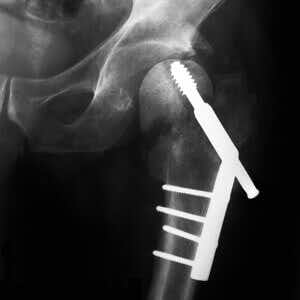
Many people choose not to eat meat because of environmental, ethical or health considerations. At least one study has shown, for example, that people on a vegan diet have lower levels of inflammation (Journal of the American Heart Association, Dec. 4, 2018). However, a British study found that people following a vegan or vegetarian diet are more likely to break their bones (BMC Medicine, Nov. 23, 2020). What’s more, a recent study has confirmed this link.
Vegetarians Are at Higher Risk of Breaking a Hip:
According to a new study from the UK, vegetarians may be at greater risk for hip fracture compared to carnivores (BMC Medicine, July 17, 2023). In the past, researchers have noted that vegetarian women are more likely to break their hips, but there has been less evidence for men. The new study was the largest yet, with more than 400,000 Biobank participants.
The investigators categorized them as meat eaters, pescatarians or vegetarians. Then, they followed these volunteers for 10 years and analyzed data on 3,500 cases of hip fracture. The vegetarians had a 50% greater relative risk for broken hips, but the absolute risk was low. The researchers estimate that 6.5 meat-eaters, 7 pescatarians and 9.5 vegetarians per 1,000 people would suffer a fracture over 10 years. That comes out to 3 more broken hips per thousand for vegetarians. On the other hand, taking the time frame into account shows what a small increase that really is.
What Did the Study Find About Vegan or Vegetarian Diets?
Scientists collected extensive diet and health information on more than 50,000 Britons between 1993 and 2001. They then followed their subjects’ health for approximately 18 years. When the study began, almost 30,000 of the volunteers reported eating meat. Approximately 8,000 avoided meat but ate fish, while 15,000 classified themselves as vegetarian. Far fewer (under 2,000) reported following a vegan diet. Vegan diets include no animal products of any sort, including eggs, milk or honey, whereas many vegetarians include one or more of these foods in their own diets.
People who followed a vegetarian diet during that time had a 9 percent higher risk of breaking a bone. Those who were vegans had a 43 percent higher risk of fracture. These are relative risks. After the scientists made statistical adjustments, fish eaters and vegetarians had 2.9 more cases of broken hips per 1,000 people over 10 years than meat-eaters. The vegans had 14.9 more hip fractures per 1,000 people over 10 years. However, the researchers did not find significant differences in the rate of broken wrists or ankles.
Vegans consumed less calcium and protein, but it is not clear from this study whether these dietary factors were responsible for the difference in fracture risk. In fact, the authors conclude with the rather unsatisfactory observation “that bone health in vegans requires further research.”
Can You Reduce Fracture Risk by Adding Dairy Products?
Recent research conducted in Australia investigated fracture risk among older people in residential care facilities. These individuals are at greater than normal risk of falls and fractures.
New research published in The BMJ suggests that when residents get more dairy products such as milk, yogurt and cheese in their diets, they are less likely to break bones (BMJ, October 20, 2021). In this study, more than 7,000 elderly people in Australia care facilities were randomized to get extra dairy products or to follow their usual menu. The investigators did not specify how often the usual menu followed a vegan or vegetarian plan.
Those who got more dairy had a 33% lower risk of fractures overall and 46% lower risk of hip fractures. This was comparable to the benefits from some osteoporosis drugs.
How Do Vegan or Vegetarian Diets Stack Up?
Previously, scientists comparing the nutritional qualities of diets have given vegan or vegetarian eating plans high marks (Nutrients, March 24, 2014). People who consume whole grains, vegetables, fruits and plant protein such as beans and legumes score higher in nutrient density. However, vegans do get less calcium than guidelines recommend. Perhaps that is why they are more likely to break bones.
On the other hand, a Swiss study offered more details (European Journal of Nutrition, Feb. 2017). The researchers agreed that vegans get less calcium, along with vitamins D and B12. Their biggest dietary shortfall was zinc. Vegetarians were most likely to consume less vitamin B6 and niacin than needed. Omnivores were most likely to lack folic acid.
The scientists concluded:
“Despite substantial differences in intake and deficiency between groups, our results indicate that by consuming a well-balanced diet including supplements or fortified products, all three types of diet can potentially fulfill requirements for vitamin and mineral consumption.”
Citations
- Shah B et al, "Anti-Inflammatory Effects of a Vegan Diet Versus the American Heart Association-Recommended Diet in Coronary Artery Disease Trial." Journal of the American Heart Association, Dec. 4, 2018. DOI: 10.1161/JAHA.118.011367
- Tong TYN et al, "Vegetarian and vegan diets and risks of total and site-specific fractures: results from the prospective EPIC-Oxford study." BMC Medicine, Nov. 23, 2020. DOI https://doi.org/10.1186/s12916-020-01815-3
- Webster J et al, "Risk of hip fracture in meat-eaters, pescatarians, and vegetarians: a prospective cohort study of 413,914 UK Biobank participants." BMC Medicine, July 17, 2023. DOI https://doi.org/10.1186/s12916-023-02993-6
- Iuliano S et al, "Effect of dietary sources of calcium and protein on hip fractures and falls in older adults in residential care: Cluster randomised controlled trial." BMJ, October 21, 2021. doi: https://doi.org/10.1136/bmj.n2364.
- Clarys P et al, "Comparison of nutritional quality of the vegan, vegetarian, semi-vegetarian, pesco-vegetarian and omnivorous diet." Nutrients, March 24, 2014. DOI: 10.3390/nu6031318
- Schüpbach R et al, "Micronutrient status and intake in omnivores, vegetarians and vegans in Switzerland." European Journal of Nutrition, Feb. 2017. DOI: 10.1007/s00394-015-1079-7

